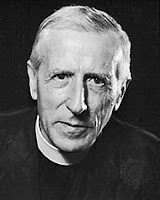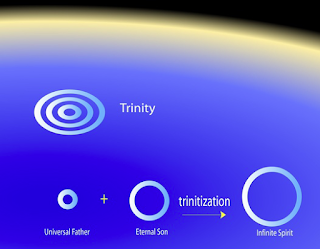Truths We Believe about God, Part 5
A Biblical & Theological Rejection of Wm. Paul Young’s book, Lies We Believe About God
Part 1: Truths We Believe About God
Part 2: Doing the Universalist Twist
Part 3: OUR Way or THE Way?
Part 4: An Imaginary Cosmic Reality
Prove all things; hold fast that which is good.
Abstain from all appearance of evil.”
—The Apostle Paul (Emphasis added, 1 Thessalonians 5:19-22)
 |
| An occult view of Trinitization* |
A Review of the Book’s Chapters (continued)
Chapters 20-28
Chapter 20
“God is a divine Santa Claus.”
- Young: “I think there are two basic ways we tend to see God as Santa Claus: as the Nice Santa God and as the Nasty Santa God…. The Nice Santa God is wondrous…. The Nasty Santa God is our imagination of the darkness behind Jesus—God the Father. It is God the Father who requires perfect performance and moral behavior.” (LWBAG, 174, 175-176) [Question: In imagining the darkness of the Father behind Jesus, when might imagination become accusation?]
- James the Brother of Jesus: “Every good gift and every perfect gift is from above, and cometh down from the Father of lights, with whom is no variableness, neither shadow of turning.” (James 1:17)
Comments: Young is right. In the imagination of the mind, Christian civilization has corrupted the meaning of Christmas. Thus in the understanding of God has suffered from which Young constructs his nice-Santa or nasty-Santa God. From their childhood people’s imaginations have conditioned them to think that the holiday (i.e., Holy Day) is about Santa’s gift-gigs and not about the remembrance of Jesus’ coming to die for our sins and be our Savior. “Fear not to take unto thee Mary thy wife” the Angel of the Lord told Joseph, “she shall bring forth a son, and thou shalt call His name Jesus: for He shall save his people from their sins” (Emphasis added, Matthew 1:20-21). The author cites anecdotal evidence (he’s met many people who have had trouble forgetting their childhood imaginations of the Santa-god) for people creating “incoherent views of God,” the false impression that if we’re good He’ll be nice, and if we’re bad He’ll be nasty. (LWBAG, 175-176)
Unfortunately Christians, perhaps brainwashed by the substitution of a materialistic nice or nasty Santa for our good and gracious Heavenly Father and Savior, misunderstand God. It seems engrained in people, irrespective of Christmas, to come to God for what they can get out of Him anyway (e.g., the wealth gospel which is prevalent all over Christianized Africa). But remember: God gives gifts not for reason of our performance but for reason of His promise and providence, not for reason of our goodness but for reason of His grace.
“But my God” wrote the Apostle Paul, “shall supply all your need according to his riches in glory by Christ Jesus” (Philippians 4:19). To those who have placed their faith in the Gospel, the good God gives, “no strings attached”! (John 3:16) All God requires for us to please Him is faith in His Son, that Jesus died on the cross for our sins and was raised from the dead on account of our justification (Hebrews 11:6; 1 Corinthians 15:3-4; Romans 4:25). On the basis of faith God gives eternal life to those who believe on “His only begotten Son” (Greek monogenes) to be their Savior. They will be given eternal life and they shall not/no never perish (John 1:27-30). And for reason of common grace, the Father “maketh his sun to rise on the evil and on the good, and sendeth rain on the just and on the unjust” (Matthew 5:45). To one extent or another all people share in God’s immediate goodness.
In Jesus’ statement, by the way, do you see how He did not lump humanity in one group? To Him all people did not reside in one Cosmic box; “the just” (dikaios) were categorized to be in one box while “the unjust” (adikaios) in another. There are people whose outward obedience to the Law indicates they are right (just) with the Father and those whose behavior indicates they are not (unjust). Lest any might think that God’s common grace eventuates in universal justification, remember Jesus’ real-life illustration where the Pharisee bathed himself in his own self-justification while the tax collector cried out, “God be merciful to me the sinner!” (Luke 18:9-14) Of the two, the tax collector “went to his house justified,” or right with God (Greek dikaioo, Luke 18:14). The Pharisee just went home. As the New Testament does not teach universal-reconciliation, neither does it teach universal-justification.[48]
Chapter 21
“Death is more powerful than God.”
- Young: “‘I don’t think God would ever say that once you die, your fate is sealed and there is nothing that God can do for you.’…I do believe that the idea that we lose our ability to choose at the event of physical death is a significant lie and needs to be exposed….I propose that the event of death introduces a crisis (krisis—the Greek word, as in ‘Day of… judgment’), a restorative process intended to free us to run into the arms of Love.” (LWBAG, 182, 185-186, 187)
- Jesus Christ: “Marvel not at this: for the hour is coming, in the which all that are in the graves shall hear his voice, And shall come forth; they that have done good, unto the resurrection of life; and they that have done evil, unto the resurrection of damnation.” (John 5:28-29)
- The Book of Hebrews: “And as it is appointed unto men once to die, but after this the judgment.” (Hebrews 9:27)
- The Apostle John: “This is the second death, the lake of fire…. And whosoever was not found written in the book of life was cast into the lake of fire.” (Revelation 20:15)
Comments: At first glace, the chapter’s title is deceiving. At issue with Young is not whether there will be a resurrection from the dead (Contra the New Testament teaching), but whether there will occur a final and forever separation (death means “separation”) between God and the ungodly. To Young, death means restoration, not separation; that after death one’s eternal destiny is not “sealed” or “locked” down. (LWBAG, 182) People who are separate from God in this life will possess the choice to unite with Him in the next. According to Young’s universalism, sooner or later, whether in this life or the next, God will restore all humans into the fold of His “love.” If people live by their wrong choice in this life they will, when confronted up-close and personal with the Trinity’s love, make the right choice in the next.
This amounts to a gospel of a “second chance” and is consistent with his belief and teaching of universal reconciliation. While Young may “believe… think… suggest… propose” (his words) this to be the case, such teaching contradicts the Bible and makes insignificant any choice we might make in this life to either put our faith in Jesus Christ as the Savior for our sins or “no.” That’s why Paul the Apostle wrote: “Behold, now is the accepted time; behold, now is the day of salvation.” (2 Corinthians 6:2)
Chapter 22
“God is not involved in my suffering.”
- Young: “Death is always accompanied by suffering. But God refuses to be absent from the Creation and infuses our suffering with Presence and Love.” (LWBAG, 193)
- The Apostle Paul: “The love of God is shed abroad in our hearts by the Holy Ghost which is given unto us…. Likewise the Spirit also helpeth our infirmities: for we know not what we should pray for as we ought: but the Spirit itself maketh intercession for us with groanings which cannot be uttered.” (Romans 5:5; 8:26)

Teilhard de Chardin
Sidebar:
The “Trinitization” of the Universe
As he does about twenty times in The Shack, Young spells “Creation” with an upper case “C” suggesting he believes that divineness permeates creation. According to Young’s template (that everything’s inside the Trinity), this might be called the “trinitization” of the universe (his version of pantheism). The being and becoming of everyone and everything inside the Trinity, more than the attribute of God’s omnipresence (Psalm 139:7-10), accounts for God’s presence everywhere, which “Presence” he spells with a capital “P.”Of the universe Teilhard de Chardin (1881-1955) stated one aspect of his spiritual worldview involves a mystery “of the creative union of the world in God, or Pleromization.”[49] What de Chardin did was take “the fullness” (i.e., Greek pleroma), which dwelt only in Christ according to the Apostle Paul (Colossians 1:19), and illegitimately make a quantum transfer of the Pleroma so that it would permeate the entire universe—from in Christ into cosmos as it were. As it pleased the Father “for all the fullness (pleroma) to dwell in” His beloved Son, so, according to de Chardin, it also pleased the Father to infuse the same fullness into an evolving creation.
Teilhard de Chardin, according to Professor King also called the “pleromization” of the universe the “trinitization” of creation, where “centered on Christ…. The entire cosmic process is seen as going to the Father through the Son in the Spirit.”[50] In reading about the “trinitization” of the universe, one is led to consider whether de Chardin is a seminal source from whom both Young and Kruger derive their thinking that everyone and everything’s inside the Trinity, that “Inside of this moving divine dance of relationship, everything was created: every human being, every plant, every subatomic particle, everything.” (LWBAG, 127-128)
Comments: Agreeably with Young, the Bible teaches, as indicated by the verses quoted above, that the loving Spirit of the living God co-agonizes with and in believers amidst their suffering in a fallen creation. But the presence of the Comforter is not promised to unbelievers because, “if anyone does not have the Spirit of Christ, he does not belong to Him” (Romans 8:9b, NASB; Matthew 28:20b; Hebrews 13:5).
Personal Testimony: On November 9, 2006, I can testify of the Jesus’ comforting presence in the person of the Holy Spirit during my heart attack, when seven times I had to be defibrillated during an hour and half emergency ride to the hospital, Bajcsy-Zsilinszky Kórház, in Budapest, Hungary. Dazed and slightly conscious, I said several times to the attending doctor and emergency helpers, “Thank you for trying to help me.” For that they called me “The American Gentleman.” God gave me that utterance. I relate this to you dear believer-readers for this reason only: in the hour of trial the same comfort the Spirit gave to me He will give to you. Amidst all our trials, life threatening or not, we can with assurance sing in the Spirit,
Just when I [we] need Him most,
Just when I [we] need Him most,
Jesus is near to comfort and cheer,
Just when I [we] need Him most.
—William C. Poole, Just When I Need Him Most, 1907.[51]
 |
| An occult view of Trinitization* |
Chapter 23
“You will never find God in a box.”
- Young: “I grew up in a world of boxes: us and them, in and out, worthy and unworthy, believer and unbeliever, saved and unsaved, and on and on. Boxes. Cages. Those Pentecostals. Those Baptists. Those Muslims. Those New Agers. Those Taoists…. Our arrogance is that we could craft something, a box, that can keep God out…. ‘The only time we will find God in a box is because God wants to be where we are.’ And that is all the time.” (LWBAG, 199, 201) [In Young’s world there is no need to “coexist,” because every religion and spiritual tradition already exist together in a “trinitized” cosmos, ed.]
- Jesus Christ: “The scribes and the Pharisees sit in Moses’ seat: All therefore whatsoever they bid you observe, that observe and do; but do not ye after their works: for they say, and do not.” (Matthew 23:2-3)
- The Apostle Paul: “But though we, or an angel from heaven, preach any other gospel unto you than that which we have preached unto you, let him be accursed. As we said before, so say I now again, If any man preach any other gospel unto you than that ye have received, let him be accursed.” (Galatians 1:8-9) [The word accursed (Greek, anathema) does not mean “to go to hell”—though that will be the consequence of believing a different gospel which is no Gospel—but advises believers to separate themselves from those who preach a false gospel like universal reconciliation. Believers were to stay in their box and keep the false “gospelers” in theirs, ed.]
- The Apostle Paul: “Now I beseech you, brethren, mark them which cause divisions and offences contrary to the doctrine which ye have learned; and avoid them. For they that are such serve not our Lord Jesus Christ, but their own belly; and by good words and fair speeches deceive the hearts of the simple.” (Romans 16:17-18) [Again, the Apostle Paul put false teachers in a box! Ed.]

A popular New Age bumper sticker to unite all world religions
Comments: Consistent with his and Kruger’s universalism which proposes that everyone’s “trinitized,” Young says the only box God puts Himself in is where we are. But Christians, especially fundamentalists and some evangelicals, arbitrarily create boxes to separate themselves from people of other spiritual traditions, religions and practices. This contradicts Young’s imagining that every denomination, spiritual tradition and religion and tradition cosmically reside inside the Trinity, and what God has joined together let no man drive asunder. So boxes are designed by religious land owners to keep others off their property—“No Trespassing!” Yet the leaders of the Jews rejected Jesus because didn’t fit in their box! Jesus told the Jewish leaders He came from His Father and from “above.” Knowing Jesus’ parents, the Jews told Him, “No way!” So they accused Him of blasphemy.
Today, Muslims put Christians as well as Jews in a box. In the Middle East and Sub-Sahara Africa they kill “the infidels,” the people who are not in their box. Evidently in real life, the hypothesis that we are all in the same box does not work out! Come to think about it, the Jesus of Scripture doesn’t fit in a lot of people’s boxes.
Question: Should believing Christians keep false teachers in a box, those who hold “to a form of godliness although they have denied its power”? The Apostle Paul instructs Timothy and his hearers, “Avoid such men as these.” (2 Timothy 3:5; See 2 Thessalonians 3:6.) Did Yahweh, the covenant God of Israel, instruct the nation to avoid the box of “Canaanite” spirituality? (See Deuteronomy 18:9-14.) Israel was to avoid that box not because they created it, but because Yahweh did. The Lord boxed them in as He boxed the Canaanites out!
Come to think of it, the Bible is filled boxes—the Law forbade the men of God’s chosen nation Israel, one box, from taking wives from surrounding nations, another box (Deuteronomy 7:3-4). There are yet other boxes; believers and infidels (2 Corinthians 6:14-18); light and darkness (Ephesians 5:11); future believers and the coming harlot called Babylon (Revelation 18:4); and so on. Come to think of it, in the Bible there seem to be boxes everywhere, not because man built them but because God ordered them. Yet if as Young and Kruger propose we’re all inside the Jesus-Trinity, there can be no separation, no categories, and no boxes, just everyone singing together, “Kumbaya, my Lord, Kumbaya” (Come By Here My Lord, Come By Here).
Chapter 24
“Not everyone is a child of God.”
- Young: “Every human being you meet, interact with, react and respond to, treat rudely or with kindness and mercy: everyone is a child of God.” (LWBAG, 206)
- The Apostle Paul: “As we have therefore opportunity, let us do good unto all men, especially unto them who are of the household of faith.” (Emphasis added, Galatians 6:10)
- Jesus Christ: (To some Jewish leaders) “Ye are of your father the devil” (John 8:44)
- The Apostle Paul: “Now if any man have not the Spirit of Christ, he is none of his.” (Romans 8:9b)
- The Apostle Paul: “But it is not as though the word of God hath come to nought. For they are not all Israel, that are of Israel: neither, because they are Abraham’s seed, are they all children (tekna): but, In Isaac shall thy seed be called. That is, it is not the children (tekna) of the flesh that are children (tekna) of God; but the children (tekna) of the promise are reckoned for a seed.” (Emphasis added, Romans 9:6-8)
Comments: As regards this chapter, I would refer readers to my previous evaluation of it, “Truths We Believe about God Part 2.”
Chapter 25
“God is disappointed in me.”
- Young: “God knows you for who you truly are and grieves for the distance between that truth and what you believe about yourself. It is from that gap of darkness and lies that we project God’s disappointment and abandonment. God is never disillusioned by you; God never had any illusions about you in the first place. God is never disappointed in you; God has no expectations.” (LWBAG, 214).
- The Lord God: “And God saw that the wickedness of man was great in the earth, and that every imagination of the thoughts of his heart was only evil continually. And it repented the Lord that he had made man on the earth, and it grieved him at his heart.” (Emphasis added, Genesis 6:5-6)
- Jesus Christ: “O Jerusalem, Jerusalem, thou that killest the prophets, and stonest them which are sent unto thee, how often would I have gathered thy children together, even as a hen gathereth her chickens under her wings, and ye would not!” (Matthew 23:37)
- The Apostle Paul: “And grieve not the holy Spirit of God…. Let all bitterness, and wrath, and anger, and clamour, and evil speaking, be put away from you, with all malice.” (Ephesians 4:30-31)
Comments: Often I’ve heard people say that because they don’t get from God what they want they’re disappointed in Him. In that the key concept of how the personal God interacts with humans is “relationship” (“Mack, I am especially fond of you,” says Jesus in The Shack, p. 217), how can it be stated with assurance that never-ever does God become disappointed with us? In that Jesus said He was especially fond of Mack, might He not be so especially fond of someone else? Was God especially fond of me when I failed to walk with Him in my late teens and early twenties? I don’t believe He was. Why was the Holy Spirit pricking my conscience to repent and by grace through faith get life right? Or were my feelings of guilt just my unworthy projections about myself? Granted, our heavenly Father is not petulantly disappointed with us “all the time” as some human fathers might be. (Young: “My father was disappointed in me—all the time.” LWBAG, 210) But there are times… when we fail to live up to our potential for His glory and our good. As I look back on my life, I am comforted by this reminder in Hebrews:
—Hebrews 12:5-7
Further, if during our times of disobedience when God becomes disappointed with His sons, why has He provided a way to restore fellowship with Him through our confession and His forgiveness? (See 1 John 1:9.) To say God does not become disappointed in us to deny the love He has for us and the grace He gives to us. God does not enjoy watching us “mess up” (sin) and thereby complicate both our lives and the lives of others around us. To the contrary, it grieves Him. Personally, I believe that Jesus did not want to disappoint His Father (Our Father who art in heaven, too) by doing His own will, and not the Father’s. When faced by the prospect of His sacrificial death, Jesus prayed, “Abba, Father, all things are possible unto thee; take away this cup from me: nevertheless not what I will, but what thou wilt.” (Mark 14:36; See Philippians 2:8, Christ Jesus “humbled Himself by becoming obedient to the point of death, even death on a cross.”).
Regarding submission, in Young’s The Shack Jesus states to Mack that the beauty he sees in His relationship with Abba and Sarayu is that they “are submitted to one another and have always been so and always will be.” Then The Shack’s Jesus tells Mack, “we want you to join us in our circle of relationship (i.e., social Trinitarianism).” (The Shack, 145, 146) Question: When Jesus submitted/obeyed the Father, how then did the Father submit to Jesus in that circle of relationship (i.e., perichoresis)? Unless you believe like a heretical oneness Pentecostal, Jesus and not the Father became “obedient to the point of death, even death on a cross.”
In his book Faith of the Fatherless, Paul C. Vitz argues that, “Disappointment in one’s earthly father, whether through death, absence, or mistreatment, frequently leads to rejection of God.”[52] While Young’s admitted mistreatment by his father has not led him to reject God, it appears it may be a factor in his trying to redefine God. (LWBAG, 31, 210) In fairness to both Young and his father, he notes how his dad tenderly loves and cares for his mother amidst her declining health. (LWBAG, 49-50) But to make the comparison between our human fathers and our heavenly Father, between my being a father to my sons and our heavenly Father being a Father to both me and them, is like comparing God to a grumpy old man. The One simply does not compare to the other.[53] Further, God does not grieve about the gap between what He believes about us and the darkness we believe about ourselves. God grieves for reason of how we behave toward Him and toward others (Ephesians 4:25-32; “Do not grieve the Holy Spirit of God,” verse 30).
Chapter 26
“God loves me for my potential.”
- Young: “Does God love me because of my potential? No! Do I love my children because of their potential? No! If I am not yet ‘enough,’ when will I be? How are we to enjoy our children in the present if the focus is on some future potential that qualifies the value of each moment?” (LWBAG, 221)
- The Apostle Paul: “For whom he did foreknow, he also did predestinate to be conformed to the image of his Son, that he might be the firstborn among many brethren.” (Romans 8:29) [In this text the word “predestinate” (Greek, proorizo) looks forward to the future when we shall be like Jesus, not backward to eternity past when God chose/elected us (Compare Ephesians 1:4-5.) In Christ God has destined our destiny, and that is, to be like His Son, ed.]
- The Apostle John: “Beloved, now are we the sons of God, and it doth not yet appear what we shall be: but we know that, when he shall appear, we shall be like him; for we shall see him as he is. And every man that hath this hope in him purifieth himself, even as he is pure.” (1 John 3:2-3)
Comments: Young asks the question, “If I am not yet ‘enough,’ when will I be?” (LWBAG, 221) The biblical answer, one which Young may not like, is that “when he [Christ Jesus] shall appear, we shall be like (Greek homoios) him; for we shall see him as he is” (1 John 3:2). Therein resides our potential! While we are becoming like Christ now we shall in the next dimension of life become completed in Christ. (We shall become like (Greek homoios) Christ, but we shall not become identical (Greek houtos) to Christ, John 1:2; 3:2; etc.). We shall not become the “little-Christs” or “mini-Messiahs” as Young might call us. (LWBAG, 53) This is a purifying hope. Because we are “in Christ” shall become “like Christ”! Though we’re not there yet, by God’s grace we’ll get there. Among other reasons, God does love us for the potential we share in His Son.
By the way, love based upon potential is not all bad. Major league baseball teams, as well as other professional sports franchises, draft players not for where they are in their development, but for their potential, for what they might become.
Chapter 27
“Sin separates us from God.”
- Young: “Sin, then, is anything that negates or diminishes or misrepresents the truth of who you are, no matter how petty or ugly that is.” …“If separation is a lie, does it mean that no one has ever been separated from God? That is exactly what it means.” (Emphasis added, LWBAG, 229, 232)
- The Prophet Isaiah: “Your iniquities have separated between you and your God, and your sins have hid his face from you, that he will not hear.” (Emphasis added, Isaiah 59:2)
- The Prophet Habakkuk: “Thou art of purer eyes than to behold evil, and canst not look on iniquity.” (Habakkuk 1:13)
- The Apostle Paul: “That at that time ye were without Christ, being aliens from the commonwealth of Israel, and strangers from the covenants of promise, having no hope, and without God in the world: But now in Christ Jesus ye who sometimes were far off are made nigh by the blood of Christ.” (Ephesians 2:12-13)
- The Apostle John: “Whosoever committeth sin transgresseth also the law: for sin is the transgression of the law.” (1 John 3:4)
Comments: If we’re all together inside the Jesus-Trinity, “relationships,” given sin’s presence, might become broken. It was that way between Adam, Eve and God in Eden (Genesis 3:8-10). Yet according to Young’s template, if everything is inside God, then hypothetically there can be no sin in God’s presence—that is breaking God’s Law—lest inside the Trinity there might be an exchange of sinning between humanity and deity. Hypothetically, in such an exchange man might conceivably make God a sinner for His tolerating that which is against His nature (2 Corinthians 5:21; 1 Peter 2:22). The Law was given to show what a good relationship might look and behave like, first between man (generic) and God and then between man (generic) and man (generic).
Chapter 28
“God is One alone.”
- Young: “If God has ever been alone, there would be neither a basis in the universe for love nor a framework for relationship. Love is other-centered and self-giving, but if there was no ‘other’ in the beginning and God was alone, then God cannot be Love. Merciful, perhaps, but not Love.” (LWBAG, 239)
Comments: Interesting…. The most fundamental belief about God in Islam is his absolute unity (i.e., tawhid) and singularity, “There is no god but God,” Muslims confess. Of Allah’s singularity, one pious writing states that before creation, “God was alone; around him was the Void.” See Cyril Glassé, The New Encyclopedia of Islam (Walnut Creek, CA: AltiMira Press, 2001): 44. I point this out to contrast the loving Christian Trinity to Islam’s unloving Unity. The Apostle John stated that “God is love.” (1 John 4:8) But Young capitalizes “Love” as if suggesting “Love” is God. However, the Apostle’s statement does not indicate that “love” is God for the Greek text reads: “Because the God is love.” In that no definite article (“the”) precedes the word love (agape), the text does not say “the love is God.”
But I do agree with Young on the point that a deistic Unitarian God or Muslim “alone-God” like Allah, would be incapable of love. If God was utterly alone before the beginning of time, before the Void, then the divine being would be incapable of loving others because there would be no others to love, and that becomes the dilemma Islam’s believers find themselves in. They cannot love but only submit to Allah who is Will. From such a perspective, the only being God would have the capacity to love would be himself. Samuel Zwemer (1867-1952), noted scholar of Islam and missionary to Muslims, observed:
The human heart craves a God who loves; a personal God who has close relations with humanity; a living God who can be touched with the feeling of our infirmities and who hears and answers prayer. Such a God the Koran does not reveal. A being who is incapable of loving is also incapable of being loved.[54]
So to experience the feeling of Allah’s love, Sufi Muslims turn to mysticism, a search orthodox Islam views as heretical because to the orthodox, “Allah is too rich and too proud and too independent to need or desire the tribute of human love.”[55]
The irony of Young and Kruger’s template of breaking down boxes in order to place Islam inside the Christian God is that to Muslims believing in the Trinity and the deity of Jesus Christ is heresy. Only the Trinitarian understanding of God allows for love to be an (not the) essence of His eternal being (See John 17:24, “Thou [Father] lovedst me [Jesus] before the foundation of the world.”)
To be continued . . .
Endnotes:
[48] Universal-reconciliation demands universal-justification, and one ace text universalists cite to prove universal-justification is Romans 5:15 (Emphasis added), “But not as the offence, so also is the free gift. For if through the offence of one many (polus) be dead, much more the grace of God, and the gift by grace, which is by one man, Jesus Christ, hath abounded unto many (polus).” Universalists argue for equivalence between the many who died in the first Adam and the many who receive grace in Jesus Christ, the second Adam. However, the context (surrounding verses) contradicts establishing equivalence. First, the analogy the Apostle Paul invokes is general, not exact. In the preceding verse the Apostle called Adam “a type of Him [Jesus Christ] who is to come” (Emphasis added, Romans 5:14, NASB). The Greek word tupos is sometimes used of the impression or dent left on something after a blow had been administered to it (i.e., like the dent on the fender of a car). Second, though all humans were made sinners because of the first Adam’s disobedience (excepting Jesus of course), all humans are not consequently saved by Christ’s obedience. The Apostle makes this distinction in Romans 5:15 and 17 (NASB). The many-all who died in the one Adam (v. 15) compose one group while “those who receive the abundance of grace and… the gift of righteousness… through the One, Jesus Christ” compose the other group. The contrast Paul invokes is between the many-all who died in Adam’s transgression (all of us) and the many-those who “reign in life through the One, Jesus Christ” (some of us). In other words as regards the offer of grace and righteousness from Jesus Christ, there are receivers (like the destitute tax collector) who reign in life and there are rejecters (like the self-righteous Pharisee) who do not (Luke 18:9-14). Rejecters may be prominent and powerful, but they do not reign in Christ in life.
[49] Ursula King, Christ In All Things: Exploring Spirituality with Teilhard de Chardin (London, GB: SCM Press Ltd., 1997): 67.
[50] Ibid: 68.
[51] William C. Poole, “Just When I Need Him Most,” 1907, Timeless Truths (http://library.timelesstruths.org/music/Just_When_I_Need_Him_Most/).
[52] Paul C. Vitz, Faith of the Fatherless: The Psychology of Atheism (Dallas, TX: Spence Publishing Company, 1999): inside front cover jacket.
[53] Ray Befus, “Chasing God: Thursday Night,” VineyardVideos, November 21, 2013 (https://www.youtube.com/watch?v=etTp_ZpLMi8). In this video Ray Befus shares the personal confusion and conflict he experienced about our heavenly Father and the image his father, who was also a pastor, projected into his life when he was young.
[54] Samuel Zwemer, The Moslem Doctrine of God (New York, NY: American Tract Society, 1905): 111. See also Larry DeBruyn, “Christ or Allah: Do Christians and Muslims Worship the Same God?” December 25, 2015, Guarding His Flock Ministries (http://guardinghisflock.com/2015/12/25/christ-or-allah/#more-3051).
[55] Ibid. Since reading Zwemer’s book years ago, my conviction is that only the Trinitarian God of Christianity is capable of being, exhibiting, giving and receiving love.
*Ed. Note: The first graphic at the top came from HERE. The second graphic was excerpted from HERE. These two graphics depict the sci-fi cult views of The Urantia Society. It must be noted that their Book of Urantia appears to have borrowed Teilhard’s term and greatly expanded his concept of Trinitization. It is NOT recommended that the reader spend any time researching this since it delves deeply into the dark occult. I was exposed to the Book of Urantia while a hippie ~ Sarah H. Leslie
Reprinted with permission of the author. The original article is posted at: http://guardinghisflock.com/2017/06/12/truths-we-believe-about-god-5/#more-3292







